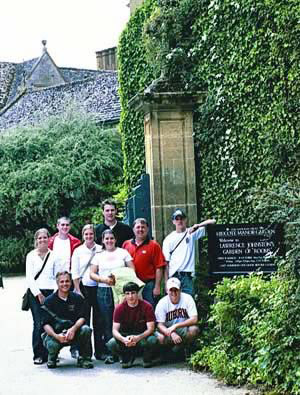An International Experience: College’s first study-abroad experience earns high marks
By: Jamie Creamer
For Richard Sluznis of Potomac, Md., participating in the AU College of Agriculture’s 2005 horticulture summer study-abroad program at Myerscough College in Bilsborrow, England, was basically a no-brainer.
“It was cheaper for me to go to England than it would have been for me to stay here for the semester and pay out-of-state tuition,” says the senior landscape design major, one of eight students who spent the summer in England. “I actually saved more than 2,000 bucks-and got the experience of a lifetime to go along with it.”
While at first glance, the six-week-long program came with a hefty price tag-$5,000 plus airfare-that figure included tuition, room and board, books and numerous day trips to British gardens of note.
In return, the benefits of the college’s first study-abroad venture were enormous.
“For starters, they were able to clear 13 semester hours of credit that count straight toward their degrees, and to do so with outstanding faculty in what was basically a 1-to-8 teacher-student ratio,” says Jeff Sibley, AU horticulture associate professor who organized the international experience. “But the real benefit was the international awareness this program gave them, from how the government and various agencies and policies impact the use of public and private lands to socialized health care to the whole cultural experience of day-to-day life in another country.”
As a key requirement of the program, all the students who participated have to share his or her experiences with fellow students by making a presentation to a class about the program and what they got out of it.
But nobody has had to “require” these eight students to do anything of the sort. They all came back pumped up over the experience and filled with nothing but praise and enthusiasm for what will always be a most memorable phase of their lives.
“It was definitely a once-in-a-lifetime opportunity,” says Mallory Jones, a junior majoring in landscape design. “The whole experience was incredible—far better than I would ever have even anticipated.”Classmate Katie Baba concurs.

Posing for a group shot are, kneeling, program
organizer Jeff Sibley, Kyle Creamer and Myers
Lacy. Standing, from left, Katie Baha, Richard
Sluznis, Mallory Jones, Bryan Plett, Amanda Maples,
CoAg Development officer Mark Wilton and Scott Holder.
“England was the perfect place to learn about horticulture because of all the beautiful gardens, and the classes were great, and the program was the perfect length,” the junior says. “I can’t think of a thing that should be changed. It was an awesome experience.”
It wasn’t a cakewalk. Classes were “intense,” Holder says, and he gets no argument from the others.
“The coursework was tough, because we were cramming 13 hours’ credit into six weeks,” Myers Lacey says. “But we had a great time doing it, and we saw some amazing gardens.”
Students were in class all day Mondays, Tuesdays and Thursdays, with Wednesdays and Fridays set aside for garden tours, visits to historical sites and other teacher-directed planned activities. Weekends were free time, giving students “ample time for personal adventure,” Sibley says.
All agree that the teachers were top-notch and made the program what it was. The four Myerscough faculty members were highly knowledgeable and experienced, both in subject matter and in hosting international students. They were also keenly focused on quality instruction and extremely approachable.
“They put a lot of emphasis on learning, not just memorizing,” Sluznis says. “When you took a test, you knew the material.”
“During the school year, most of Myerscough’s students are 16- and 17-year-olds, so they treated us more like colleagues than students,” Baba says. “They made the classes fun. It was great getting to know them.”
In addition to the eight students, four horticulture faculty and two CoAg administrators spent one to two weeks with the student group.
“The program was fantastic,” professor Dave Williams says. “I came back really excited about it, and I’m already talking it up to students for next year. I wish they could all go.”
That horticulture is adding the program as an option is a definite plus for the already highly popular undergraduate curriculum.
“We (faculty and administrators) all came away with an extremely positive feeling about the program,” Sibley says. “We see it as a major component of student opportunities for the future and as a tool to recruit students into horticulture.”
Sibley already has most of next year’s program mapped out and is accepting applications for the trip. His goal is a minimum of 12 students participating. The more students that participate, the less expensive the program will be per student.
To be eligible, a student must have a minimum 2.5 GPA, must not yet have taken the courses offered in the study-abroad program—landscape gardening, garden history and design, herbaceous plants and international seminarÑand must have at least a semester left at Auburn upon return.
The eight students are confident that participating in the program will, for them, impact the bottom line.
“Having the international experience should help put us a step ahead of the competition in the job market,” junior Kyle Creamer says. “And maybe it’ll translate into more money.”
“It’ll be an incredible thing to put on a resume,” Holder agreed.
For more information on the horticulture study-abroad program, contact Sibley at 334-844-3132 or sibleje@auburn.edu
